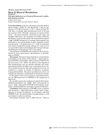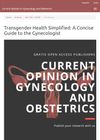 1 citations,
December 1992 in “International Journal of Dermatology”
1 citations,
December 1992 in “International Journal of Dermatology” No significant hormone differences found in postmenopausal women with androgenetic alopecia.
 October 2022 in “Linköping University medical dissertations”
October 2022 in “Linköping University medical dissertations” The method shows hair testosterone levels reflect those in saliva, but are affected by various factors and may indicate a risk for heart attack.
 October 2024 in “Journal of the Endocrine Society”
October 2024 in “Journal of the Endocrine Society” Feminizing hormone therapy increases kidney filtration rate.
 September 2024 in “Journal of the American Academy of Dermatology”
September 2024 in “Journal of the American Academy of Dermatology” Early-onset male baldness may increase the risk of metabolic syndrome.
 May 2024 in “Research Square (Research Square)”
May 2024 in “Research Square (Research Square)” Pediatric androgenetic alopecia is linked to obesity, family history, hormonal imbalances, and requires personalized treatment including managing comorbidities.
 March 2024 in “Bioscientia medicina”
March 2024 in “Bioscientia medicina” The rs6152 allele is not a good marker for baldness in the Indonesian population, but family history, age, gender, high blood pressure, and body weight are linked to the risk.
 January 2024 in “Al-Ameed journal for medical research and health sciences”
January 2024 in “Al-Ameed journal for medical research and health sciences” Testosterone is vital for male health, and its deficiency is linked to aging and common health issues.
 January 2024 in “Biomedicines”
January 2024 in “Biomedicines” Using stem cells from hair follicles to treat female hair loss is safe and effective after six months.
 January 2024 in “Experimental and clinical endocrinology & diabetes”
January 2024 in “Experimental and clinical endocrinology & diabetes” A low-glycemic diet improved hormone levels and well-being in overweight women with high androgen levels.
 November 2023 in “Curēus”
November 2023 in “Curēus” Melatonin may help manage PCOS by improving insulin sensitivity, hormone balance, and mood.
 October 2023 in “IntechOpen eBooks”
October 2023 in “IntechOpen eBooks” Genes and epigenetic changes are important in the development of Polycystic Ovary Syndrome.
 October 2023 in “Apollo medicine”
October 2023 in “Apollo medicine” The skin acts like an endocrine organ, producing hormones that affect various body functions and skin health, and understanding this can lead to new treatments.
 October 2023 in “Journal of the Endocrine Society”
October 2023 in “Journal of the Endocrine Society” Losing weight, possibly through bariatric surgery, is key to improving PCOS and hyperandrogenism symptoms in obese patients.
 September 2023 in “Fides et Ratio”
September 2023 in “Fides et Ratio” The safety and effectiveness of gender-affirming treatments for children are uncertain, with potential long-term risks like infertility.
 May 2023 in “Frontiers in Endocrinology”
May 2023 in “Frontiers in Endocrinology” Blocking CRF1 receptors improved male hormone levels and reduced testicular tumor size in men with a specific adrenal condition.
 April 2023 in “Elsevier eBooks”
April 2023 in “Elsevier eBooks” Men may have a condition similar to PCOS, possibly indicated by early hair loss.
April 2023 in “Dermatologica Sinica” The Pemphigus Disease Area Index and Autoimmune Bullous Skin Disorder Intensity Score are the best tools for assessing pemphigus severity.
 January 2023 in “Springer eBooks”
January 2023 in “Springer eBooks” New understanding of hair loss could lead to better treatments.
 December 2022 in “Cureus”
December 2022 in “Cureus” Hormones significantly influence hair growth, with conditions like hirsutism and patterned hair loss linked to hormone levels; more research is needed for full understanding.

Antiandrogens might help prevent or treat COVID-19 by blocking the virus's entry into cells.
 November 2022 in “International Journal of General Medicine”
November 2022 in “International Journal of General Medicine” Women with Polycystic Ovary Syndrome are more likely to have Non-Alcoholic Fatty Pancreas Disease, which is associated with older age, metabolic syndrome, insulin resistance, and high male hormone levels.
 November 2022 in “Journal of the Endocrine Society”
November 2022 in “Journal of the Endocrine Society” Estrogen deficiency can reduce the enzyme activity needed to activate vitamin D.
 September 2022 in “Biomedicines”
September 2022 in “Biomedicines” Lipid Accumulation Product and Free Androgens Index are effective for assessing fatty liver disease risk in women with Polycystic Ovary Syndrome.
 April 2022 in “Indian Journal of Forensic Medicine & Toxicology”
April 2022 in “Indian Journal of Forensic Medicine & Toxicology” PSA can help diagnose high androgen levels in women.
July 2020 in “International journal of clinical & experimental dermatology” Hair loss in women aged 20-30 is often linked to deficiencies in Vitamin D, zinc, ferritin, and haemoglobin, as well as low SHBG levels in those with irregular periods.

People with androgenic alopecia are more likely to have metabolic syndrome than healthy individuals.
 May 2019 in “The Journal of Sexual Medicine”
May 2019 in “The Journal of Sexual Medicine” Flibanserin's effectiveness for low sexual desire in premenopausal women may vary based on hormone levels, with normal hormone levels showing better responses.
 January 2019 in “ISGE series”
January 2019 in “ISGE series” Estrogen helps prevent artery plaque by stopping monocyte capture in blood vessels.
 September 2018 in “Cumhuriyet medical journal”
September 2018 in “Cumhuriyet medical journal” Women with more body hair tend to have thicker belly fat and more metabolic health issues.
 August 2018 in “Current opinion in gynecology and obstetrics”
August 2018 in “Current opinion in gynecology and obstetrics” Gynecologists should learn about transgender care to provide the best service.




























